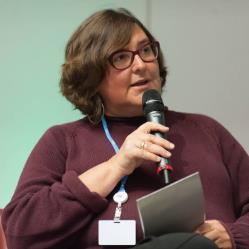Charting the Course: Discussing the Impact and Future of the Internet Governance Forum
DNS Research Federation
Session 288
Approaching the 20-year review of the WSIS+20, the global community prepares to once again evaluate the impact of the Internet Governance Forum (IGF) and determine whether its mandate will be extended. Established in 2005 through the Tunis Agenda, the IGF stands as a significant outcome of the WSIS process, having convened 18 annual meetings from 2006 to 2023.
The landscape of the Internet has undergone substantial changes, giving rise to new key trends and challenges that necessitate sustained global digital cooperation. Dealing with the complexity of emerging forms of online harms and the risks associated with technologies like Artificial Intelligence, while simultaneously addressing perennial issues such as promoting Internet access and affordability, require the Internet community to carefully consider strategies to collectively respond to these issues going forward. For Global South leaders, this forthcoming WSIS+20 review offers an opportunity to identify which Internet governance spaces deliver the most value and offer effective mechanisms to address policy priorities in their regions.
The panel will invite a diverse set of speakers to reflect on two issues: first, panellists will be invited to articulate how the IGF has generated value for their stakeholder group and region, and second, how they view the future of the IGF, particularly in relation to untapped potential and addressing both new and perennial internet governance challenges. As global Internet governance grows in complexity, the panel will reflect on what role lies ahead for the IGF to become most effective.
The backdrop of the panel will be a recent report produced by the DNS Research Federation, where the organisation has articulated ways in which the IGF has generated value for the Internet Community, in line with the mandate stipulated in the WSIS Tunis Agenda. The report is available here.

Carolina Caeiro, DNSRF Senior Internet Policy Specialist. Carolina Caeiro is Senior internet Specialist at the DNS Research Federation and Oxford Information Labs. She specialises in technology and internet governance with a focus on regional perspectives from the Global south and the interplay between technology and geopolitics. She worked for Regional Internet Registry for Latin America and the Caribbean (LACNIC) and Argentina’s first fact-checking organisation, Chequeado. At LACNIC she spearheaded regional initiatives to promote internet security, stability and access in Latin America and the Caribbean. Prior to joining the DNSRF, Carolina was Academy Associate with the US & the Americas Programme at Chatham House. She has been an active participant in the global IGF and the regional IGFs (LACIGF and APrIGF, and EuroDIG) supporting across both fora as session organiser, speaker and facilitator. She has actively participated in 7 IGFs between 2015 and 2022. She has contributed to IGF conversations on Gender Diversity, Connectivity and Community Networks, IPv6 deployment, Cybersecurity. She represented LACNIC at IGF’s LAC Space and facilitated the integration into the IGF community of LACNIC Grantees. She is currently co-chair for the Dynamic Coalition on DNS issues.

Chris Buckridge is an independent consultant in the Internet governance and digital policy space. He worked for more two decades with the Regional Internet Registries (APNIC and the RIPE NCC), and helped to drive the RIPE NCC’s engagement on issues of public policy and Internet governance. He has worked closely with intergovernmental organisations including the International Telecommunication Union (ITU), the OECD, and the United Nations, as well as the institutions of the European Union.
Chris currently serves as a member of the ICANN Board of Directors, a member of the board of the EuroDIG Association, and a member of the Multistakeholder Advisory Group (MAG) of the United Nations Internet Governance Forum. He also acts as an advisor to the Global Forum on Cyber Expertise (GFCE) and Access Partnership.

Jennifer Chung is the Director of Corporate Knowledge for DotAsia Organisation. She represents .Asia Registry in the Registry Stakeholder Group at ICANN and is a GNSO councilor for the RySG. She previously headed the Secretariat for the ICG that oversaw the transfer of the IANA stewardship from the US government (NTIA) to the global multistakeholder community. Ms. Chung was an appointed member on the United Nations Internet Governance Forum Multistakeholder Advisory Group from 2018-2020, and part of the 2022 Expert Working Group tasked by the UN Secretariat to give recommendations on strengthening and improving the IGF as a space for global multistakeholder discussion on Internet policy issues. She heads the Secretariat for IGFSA which provides support to the global UN IGF and grants seed funding to National, Regional and Youth Initiatives. She is a part of the Asia Pacific Regional Internet Governance Forum organizing team and works towards amplifying Asia Pacific views and contributions on Internet governance. Ms. Chung is a member of the ISIF.asia Selection Committee that awards grants for research and implementation of technical solutions that support Internet development in Asia Pacific. She works on Internationalized Domain Names (IDN) policies as part of the ICANN IDN EPDP working on policy recommendations on the management of variant labels. She supports efforts to achieve Universal Acceptance of domain names, a foundational requirement for a truly multilingual Internet, one in which
users around the world can navigate entirely in local languages.

Anriette Esterhuysen was the executive director of APC until March 2017. Prior to joining APC, Anriette was executive director of SANGONeT, an internet service provider and training institution for civil society, labour and community organisations. She was active in the struggle against Apartheid from 1980 onwards. From 1987 to 1992 she did information and communication work in development and human rights organisations in South Africa and Zimbabwe.
Anriette, with many others, helped establish email and internet connectivity in Southern Africa. SANGONeT hosted a Fidonet hub that provided universities and non-governmental organisations in, among other places, Malawi, Zambia and Zimbabwe, with email links to global networks as part of a collaboration between APC and the United Nations Development Programme. Anriette has served on the African Technical Advisory Committee of the UN's Economic Commission for Africa's African Information Society Initiative and was a member of the United Nations ICT Task Force from 2002 to 2005, the World Summit on the Information Society (WSIS) Working Group on Financing Mechanisms, and the Commission on Science and Technology for Development Working Group on Internet Governance Forum (IGF) Improvements. She was a member of the Multistakeholder Advisory Group of the Internet Governance Forum from 2012 to 2014.
Anriette was one of five finalists for IT Personality of the Year in South Africa in 2012, an award which recognises a person who has made an outstanding impact on the South African ICT industry. She was the only female and only civil society finalist. She was inducted into the Internet Hall of Fame as a Global Connecter in 2013. Currently Anriette is a member of the Global Commission on Internet Governance and the Council of the NETmundial Initiative. She has published extensively on ICTs for development and social justice. She holds a BA in social sciences and postgraduate qualifications in history of music and information sciences from the University of the Witwatersrand in Johannesburg, South Africa.
-
 C1. The role of governments and all stakeholders in the promotion of ICTs for development
C1. The role of governments and all stakeholders in the promotion of ICTs for development
-
 C2. Information and communication infrastructure
C2. Information and communication infrastructure
-
 C3. Access to information and knowledge
C3. Access to information and knowledge
-
 C4. Capacity building
C4. Capacity building
-
 C5. Building confidence and security in use of ICTs
C5. Building confidence and security in use of ICTs
-
 C8. Cultural diversity and identity, linguistic diversity and local content
C8. Cultural diversity and identity, linguistic diversity and local content
-
 C9. Media
C9. Media
-
 C10. Ethical dimensions of the Information Society
C10. Ethical dimensions of the Information Society
-
 C11. International and regional cooperation
C11. International and regional cooperation
The session will discuss the impact of the IGF to date and opportunities to enhance the IGF, as per the forum's mandate on the Tunis Agenda. These reflect the WSIS action lines highlighted above. Impact areas considered include:
- ISSUE-DRIVEN
- Discuss existing and emerging issues (Tunis agenda 72(a), (b), (g), (j)).
- Advise on access and affordability (Tunis agenda 72(e)).
- Help find solutions to misuse (Tunis Agenda 72(k)).
- ENGAGEMENT-DRIVEN
- Facilitate engagement and interfacing (Tunis Agenda 72(b), (c), (f))
- Exchange information, best practice and capacity building (Tunis Agenda 72(d), 72(h)).
- VALUE-DRIVEN
- Uphold WSIS values and transparency (Tunis Agenda 72(i), (l)).
-
 Goal 4: Ensure inclusive and equitable quality education and promote lifelong learning opportunities for all
Goal 4: Ensure inclusive and equitable quality education and promote lifelong learning opportunities for all
-
 Goal 5: Achieve gender equality and empower all women and girls
Goal 5: Achieve gender equality and empower all women and girls
-
 Goal 8: Promote inclusive and sustainable economic growth, employment and decent work for all
Goal 8: Promote inclusive and sustainable economic growth, employment and decent work for all
-
 Goal 9: Build resilient infrastructure, promote sustainable industrialization and foster innovation
Goal 9: Build resilient infrastructure, promote sustainable industrialization and foster innovation
-
 Goal 10: Reduce inequality within and among countries
Goal 10: Reduce inequality within and among countries
-
 Goal 16: Promote just, peaceful and inclusive societies
Goal 16: Promote just, peaceful and inclusive societies
-
 Goal 17: Revitalize the global partnership for sustainable development
Goal 17: Revitalize the global partnership for sustainable development
The session links to multiple SDGs, as highlighted above, but primarily those relating to developing resilient Internet Infrastructure in ways that fosters innovation (SDG9), and efforts to revitalize global partnerships for development through cooperation and dialogue on Internet governance and digital policy.
IGF Impact Report: https://dnsrf.org/blog/net-effects--an-evidence-led-exploration-of-igf-impact/index.html.